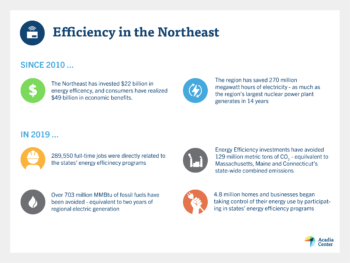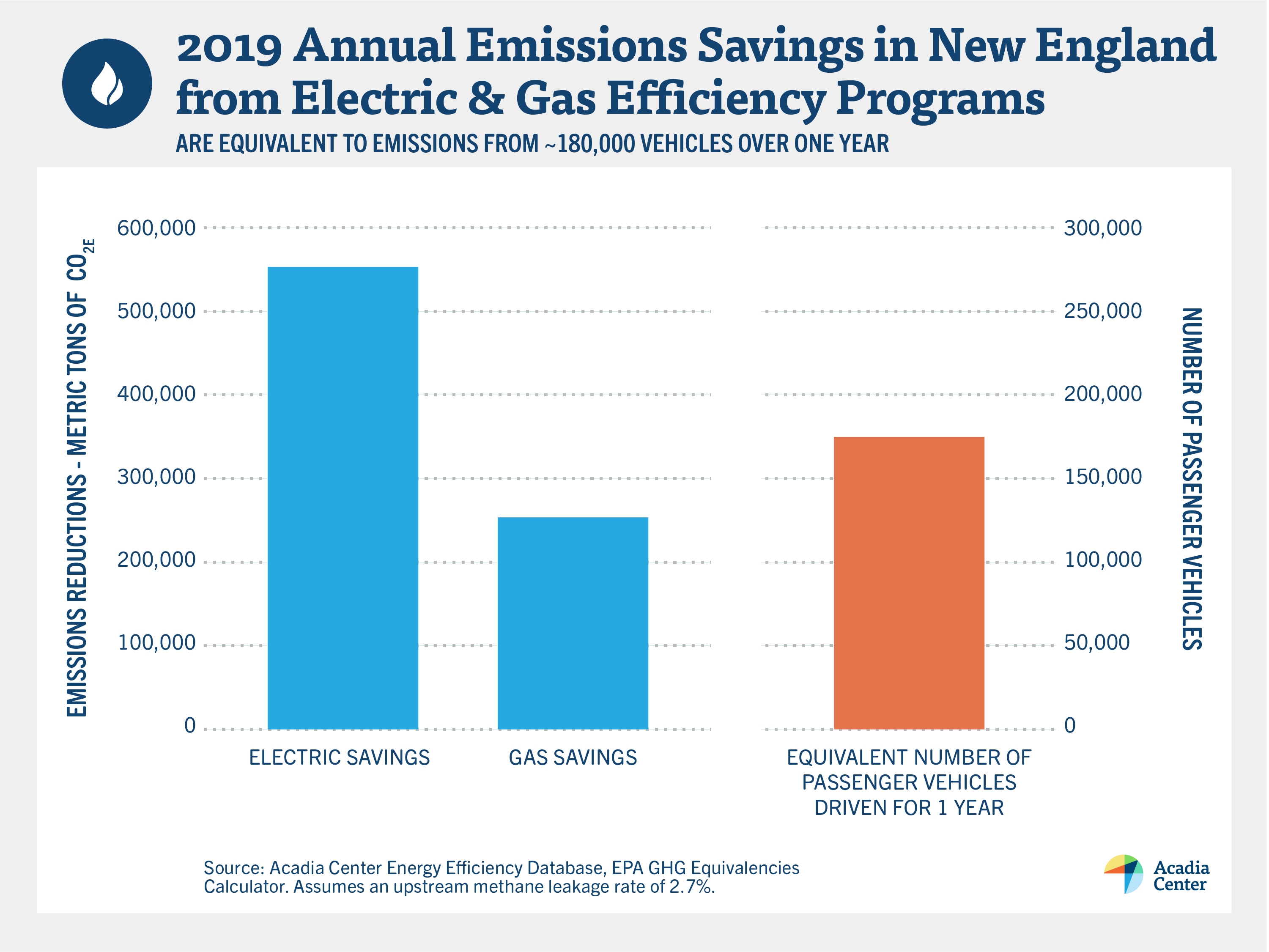Next Generation Energy Efficiency
The buildings in which we live and work are a main driver of energy use and play a key role in determining public health outcomes. Emissions from appliances and heating and cooling systems negatively impact indoor air quality, exposing residents, especially in poorly ventilated buildings, to toxic pollutants. In New England and New York, building heating, cooling, lighting, and operations are responsible for over a third of the overall emissions that contribute to climate change.
Energy efficiency, including services ranging from home insulation improvements to replacing appliances with more efficient alternatives, can improve comfort, reduce exposure to pollutants, and save consumers money. Energy efficiency is also the most cost-effective way to reduce greenhouse gas emissions and has played a major role in helping the Northeast lower carbon pollution.
The Northeast is a national leader in energy efficiency. Efficiency programs in the Northeast lead the nation in important criteria: the highest per capita investments in energy efficiency and the most ambitious energy savings goals. The regional grid operator in the six-state New England region relies on energy efficiency resources for over 14% of the power needs of the region – the highest in the country. Millions of homes and businesses have received efficiency services, which have reduced energy bills, avoided billions of dollars in higher cost energy resources, and improved public health.

Acadia Center is proud of the role it has played in advancing energy efficiency in the region and promoting the creation of stakeholder boards to guide efficiency programs, budgets and goals, but far more must be done to improve the efficiency of our homes and businesses and to ensure that all overburdened and underserved communities reap the full benefits of efficiency offerings. Programs have not delivered services adequately across all income levels and communities. Many consumers face unequal access to benefits under existing efficiency programs, and underserved communities that face the worst impacts of climate change and poor housing quality have not been able to take full advantage of efficiency programs. Clean electric heating and whole house electrification must be priorities to support the acceleration of clean energy resources and the transition away from fossil fuels. There must be better alignment between state climate goals by reforming key energy efficiency policies, regulations, and stakeholder systems, and the region must continue to value energy efficiency as a core energy resource.

Acadia Center’s Next Generation Energy Efficiency initiative seeks to tackle these challenges through a new approach – one that focuses on energy savings as a core consumer and energy system resource, but is also centered around meeting climate, environmental justice, and electrification goals. It is an approach that recognizes the interrelatedness of these efforts, which can work in concert to bring Northeast communities the future of energy efficiency.
The four challenges the Next Generation Energy Efficiency will prioritize are 1) sub-standard housing quality, 2) climate mitigation, 3) clean heating and whole-house electrification, and 4) sustaining investments in efficiency as the leading energy resource option for utilities and the power grid.
Prioritize Housing Quality Improvements
Energy efficiency must be at the center of addressing the region’s old housing stock. Energy efficiency can improve thermal comfort, reduce exposure to toxins, and lower energy costs. To better serve vulnerable populations and environmental justice communities, existing benefit-cost methodologies, which determine how efficiency programs are implemented, must incorporate climate, equity, and health benefits from building retrofits. Acadia Center will work with environmental and consumer advocates, environmental justice leaders, business interests, and efficiency vendors to develop policy recommendations that identify reforms needed to fully account for all the health, safety, and equity benefits that energy efficiency improvements deliver.
Ensure Alignment with Climate Mitigation
Every kilowatt-hour of electricity that does not need to be produced because of energy efficiency means less dirty fossil fuel use. But energy efficiency programs can achieve even deeper emissions savings if they are refocused with a greater emphasis on climate mitigation. Acadia Center will press to:
- Update efficiency statutes and regulations, including the way programs are screened through benefit-cost tests, to emphasize reductions in greenhouse gas emissions in addition to energy savings.
- Make certain that public utilities commissions consider climate and health impacts when evaluating efficiency programs; and
- Ensure that laws, regulations, and planning processes support efforts to transition from fossil fuels to clean electrification.
Embrace Clean Heating and Whole-House Electrification
If deployed together, energy efficiency and electrification can deliver greater emissions reductions while improving indoor air quality. To better align efficiency programs and electrification, Acadia Center will push for incentives for clean heating and weatherization, as well as for changes in how efficiency programs are administered to ensure co-delivery of building upgrades that are currently delivered in silos. Acadia Center will publish state-specific reports on the value of electrification and flexible demand and will push states to include electrification retrofit pathways in their efficiency plans.
Sustain Investments in Efficiency as the Leading Energy Resource
Northeast states must expand efficiency investment levels and energy savings goals to ensure deeper savings and benefits for all. As one of the fundamental components of meeting state emissions targets, efficiency efforts must be sustained in states that are already leading and improved in states that are falling behind. Acadia Center will work to ensure that decision-makers in the Northeast recognize the value and necessity of efficiency to spur large savings in public health and economic benefits. Through membership on efficiency boards and through PUC intervention related to efficiency plans, Acadia Center will continue to advocate for increased budgets and the maximum possible savings goals, provide expert commentary on state energy issues, and offer data and recommendations to counter bad decisions.
For more information:
Oliver Tully, Policy Strategist, otully@acadiacenter.org, (860) 246-7121, ext. 202



















Follow us